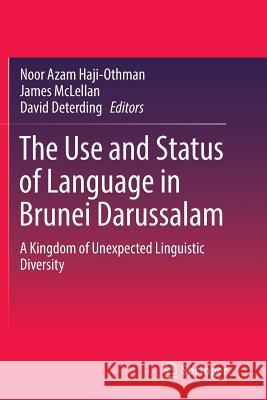The Use and Status of Language in Brunei Darussalam: A Kingdom of Unexpected Linguistic Diversity » książka
topmenu
The Use and Status of Language in Brunei Darussalam: A Kingdom of Unexpected Linguistic Diversity
ISBN-13: 9789811092695 / Angielski / Miękka / 2018 / 285 str.
Kategorie:
Kategorie BISAC:
Wydawca:
Springer
Język:
Angielski
ISBN-13:
9789811092695
Rok wydania:
2018
Wydanie:
Softcover Repri
Ilość stron:
285
Waga:
0.42 kg
Wymiary:
23.39 x 15.6 x 1.63
Oprawa:
Miękka
Wolumenów:
01
Dodatkowe informacje:
Wydanie ilustrowane











